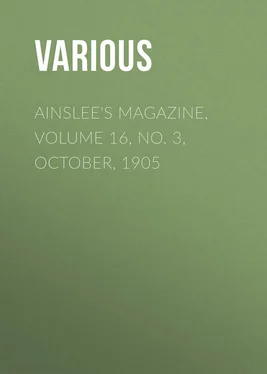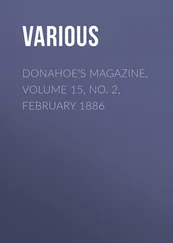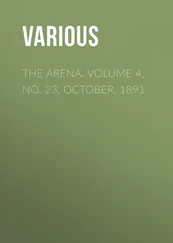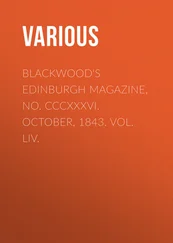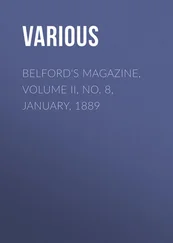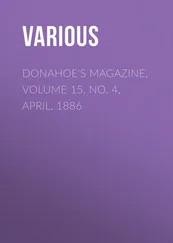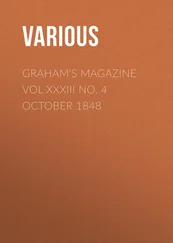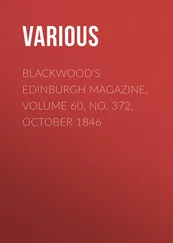Various - Ainslee's magazine, Volume 16, No. 3, October, 1905
Здесь есть возможность читать онлайн «Various - Ainslee's magazine, Volume 16, No. 3, October, 1905» — ознакомительный отрывок электронной книги совершенно бесплатно, а после прочтения отрывка купить полную версию. В некоторых случаях можно слушать аудио, скачать через торрент в формате fb2 и присутствует краткое содержание. Издательство: Иностранный паблик, Жанр: periodic, literature_20, Поэзия, foreign_poetry, short_story, на английском языке. Описание произведения, (предисловие) а так же отзывы посетителей доступны на портале библиотеки ЛибКат.
- Название:Ainslee's magazine, Volume 16, No. 3, October, 1905
- Автор:
- Издательство:Иностранный паблик
- Жанр:
- Год:неизвестен
- ISBN:нет данных
- Рейтинг книги:5 / 5. Голосов: 1
-
Избранное:Добавить в избранное
- Отзывы:
-
Ваша оценка:
- 100
- 1
- 2
- 3
- 4
- 5
Ainslee's magazine, Volume 16, No. 3, October, 1905: краткое содержание, описание и аннотация
Предлагаем к чтению аннотацию, описание, краткое содержание или предисловие (зависит от того, что написал сам автор книги «Ainslee's magazine, Volume 16, No. 3, October, 1905»). Если вы не нашли необходимую информацию о книге — напишите в комментариях, мы постараемся отыскать её.
Ainslee's magazine, Volume 16, No. 3, October, 1905 — читать онлайн ознакомительный отрывок
Ниже представлен текст книги, разбитый по страницам. Система сохранения места последней прочитанной страницы, позволяет с удобством читать онлайн бесплатно книгу «Ainslee's magazine, Volume 16, No. 3, October, 1905», без необходимости каждый раз заново искать на чём Вы остановились. Поставьте закладку, и сможете в любой момент перейти на страницу, на которой закончили чтение.
Интервал:
Закладка:
Ainslee's magazine, Volume 16, No. 3, October, 1905
YOUNG CARRINGTON’S CAREER
BY Beatrice Hanscom
CHAPTER I
THE studio in Numero – rue Boissonade had on its holiday togs: model stand covered with rugs, tea table much in evidence, framed picture on the easel, and lilacs enough in the great brass bowl in the corner to serve as sweetly affirmative witnesses that the heart of Paris and the heart of spring had renewed their yearly alliance.
To judge from the blitheness of Carrington, he, too, had spring in his heart and a festal day in prospect.
Life, already lavish in good gifts, was on the point of giving him the one he most desired to grasp.
At twenty-one he had health, plenty of money, and a talent to which he considered health and money merely subservient – a talent which lured him to work indefatigably.
The portrait on which he had lavished himself hung on the line in the spring salon; and Velantour, the master for whom he had toiled tirelessly for the last three years – Velantour, the sternest critic in France, most sparing in praise – Velantour, whose painting expeditions in the far East were always solitary save for his trusted courier — Velantour had invited Carrington to go with him to the Vale of Cashmere and the Himalayas! To paint with him and by his side for three long, delicious months.
“It is not enough to put people’s souls on canvas, mon cher , if you can’t put nature’s heart back of them,” he had told him, hand on his shoulder. Velantour, whose caustic criticisms usually confined themselves to technique, and took small account of souls!
Carrington tingled to his finger tips in the desire to be off. Life was good – was “bully,” as Carrington phrased it. And he whistled softly, rapturous as a thrush, as he crossed the studio to lift a corner of the rug which covered a trunk masquerading as a seat, a trunk locked and strapped; packed with an infinite forethought for any possible contingency that might arise during the trip; with enough paint tubes and brushes to set up a small dealer; packed, too, with hopes and aspiration, which luckily take up no room, and do not increase the excess baggage rate. Had they weighed the smallest fraction of an ounce apiece, modern hydraulics could not have lifted that trunk a single inch.
“And we start to-night! Jove, it’s unbelievable!” he said, exultantly, as he dropped the rug corner and stood up, straight and slender and tall, a handsome boy with his black hair a trifle long, his blue eyes aglow, his delicate features alight with enthusiasm as he drew in a long breath of satisfaction.
There was a touch of the romantic in his attire – in the loosely hanging, dark gray velveteen suit that was almost black, and the soft cravat that had the color of pigeon’s blood.
He was young enough to like that sort of thing, dandy enough to order those dull gray suits by the half dozen, with long, crimson lined cloaks and marvelous soft felt hats; and handsome enough to make Velantour vow he would immortalize him in them. “ Le nouveau Van Dyck,” he whispered to himself, for he loved the boy as much as he believed in his future, and he believed in that with the intensity and concentrated fervor of a man who permits himself few beliefs.
“To have a son like that!” he would murmur – little, squat, short-legged, gray-headed, lonely old, famous Velantour; and the words wrenched his lips into the dry twist of an old grief.
For Velantour’s scapegrace son had rested many years in Père-la-Chaise.
Velantour was coming this afternoon to the informal little reunion of the half dozen friends whom Carrington had summoned to wish him God-speed.
With the warning swish of the curtains Carrington turned to see if it was he even now. But he saw instead a young fellow of his own age, a youth whose brown hair curled obstinately, whose mouth was wide and mobile, and who had the kind of snub nose one inevitably associates with jollity.
“My dear Ned, you’re most disappointing,” the newcomer stated, with burlesque complaint and a gesture that sent his hands far apart. “You ought to be putting the last touch to a tuft of grass in the foreground. It’s a poor foreground that won’t stand a few extra tufts here and there, and it’s an immensely effective proceeding. Or else you ought to be on your knees to the gods. You’re neither posing piously to please Providence, nor patently to please Paris. I’m afraid we’ve overrated your genius. You’ll never make a Whistler.”
He laughed good-humoredly as he grasped Carrington’s outstretched hand. Robert Parker, yclept Bobbins, took life easily.
“I’m so happy, Bobbins,” Carrington confided in him, “that I can’t even think. Isn’t it ripping – going east with Velantour?”
“It is for you, Rising Genius,” Bobbins assured him, “but so far as I am concerned, though I might manage to sit under a Kashmirian cedar with a fan, standing on an icy peak with a pot of paint strapped to my waistband, and a fault-finding old gentleman to tell me how badly I was using it, isn’t my ideal of bliss. No Himalayas for me.”
“Bless you, Bobbins, we’re not contracting to paint them by the yard, the way you do a fence,” expostulated Carrington, laughingly. “We’re going to make pictures, not advertise breakfast foods.”
“What is your sister going to do?” queried Bobbins.
“Elenore is going to Brittany to-morrow with the Waldens,” Carrington told him promptly.
“And Hastings, I presume, has always wanted to go to Brittany,” Bobbins laughed.
“Well, Hastings has certainly developed a sudden enthusiasm in that direction,” Carrington acknowledged.
“Do you suppose Elenore – ” Bobbins began mysteriously.
“I know enough to know that I don’t know anything about girls,” Elenore’s brother announced, promptly. “Do you suppose Hastings – ”
“I certainly do,” said Bobbins, fervently. “And he has a bad case of it. Wouldn’t go to the Bal Bullier the other night; thinks cafés chantants are vulgar; doesn’t hear what you are saying half the time, and has taken to humming ‘Home-keeping hearts are happiest.’ You don’t have to take him to the hospital to see what’s the matter with him.”
“I told him distinctly by the hour ,” a high-pitched, patrician voice floated in from the hall, “and if he doesn’t stop swearing he’ll have to put his pourboire in troches.” Coincident with the remark a fluent outburst of Parisian profanity came wafting in the open windows.
“My dear Ned,” said Mrs. Van Velt, the owner of the patrician voice, appearing in the doorway; “would you mind sending some one to chloroform my cabby? The more Carol argues with him, the more vocal he becomes. He seems to think that they also swear who only sit and wait.”
Mrs. Van Velt was a dowager unmistakably American.
She appeared to have been poured into her black satin gown at some abnormally high temperature and at a calculation perilously close. Her gray pompadour strained back from her high forehead in an apparent endeavor to oust her bonnet as an insolent trespasser on its private domain, but the bonnet, a black octopus with an intelligent jetty eye, wound two narrow black velvet tentacles firmly beneath Mrs. Van Velt’s double chin, and triumphed calmly.
“You go, Bobbins,” said Carrington, gayly. “Mrs. Van Velt, may I present Mr. Parker? Chloroforming cabbies is one of his specialties. You may be sure that it will be painless and thorough.”
“And bring back my daughter, Mr. Parker,” said Mrs. Van Velt, as placidly as though she had said spectacles or handkerchief. The obliging young knight was already half way to the door. “Carol thought she ought to argue it out with him; and as she couldn’t understand his French, and he couldn’t understand hers, it seemed perfectly safe.”
Читать дальшеИнтервал:
Закладка:
Похожие книги на «Ainslee's magazine, Volume 16, No. 3, October, 1905»
Представляем Вашему вниманию похожие книги на «Ainslee's magazine, Volume 16, No. 3, October, 1905» списком для выбора. Мы отобрали схожую по названию и смыслу литературу в надежде предоставить читателям больше вариантов отыскать новые, интересные, ещё непрочитанные произведения.
Обсуждение, отзывы о книге «Ainslee's magazine, Volume 16, No. 3, October, 1905» и просто собственные мнения читателей. Оставьте ваши комментарии, напишите, что Вы думаете о произведении, его смысле или главных героях. Укажите что конкретно понравилось, а что нет, и почему Вы так считаете.
